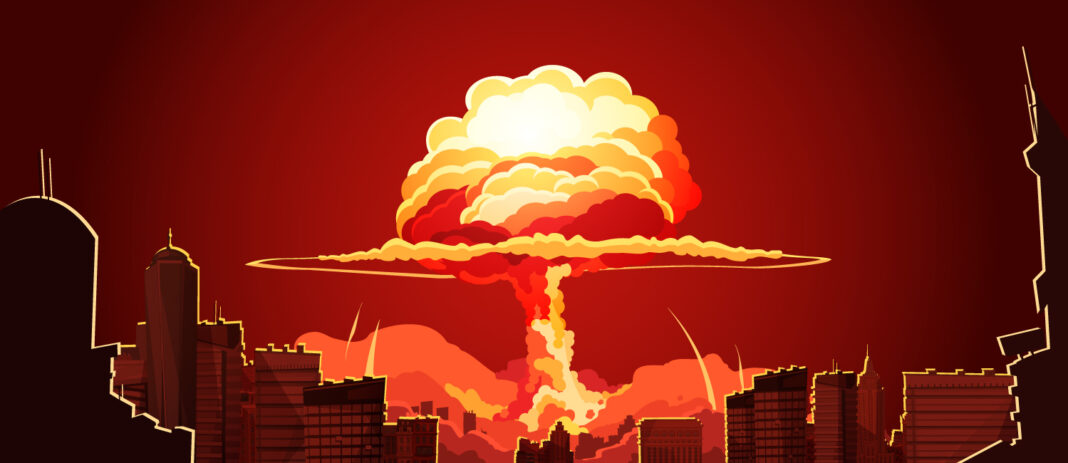In the realm of physics and celestial mechanics, the concept of three bodies has long been associated with chaos and unpredictability. Isaac Newton, renowned for his groundbreaking discoveries in gravity and celestial motion, encountered the enigmatic three-body problem, which baffled him and continues to puzzle scientists to this day. Now, as the world stands on the brink of a tripolar nuclear age, the ramifications of this problem extend far beyond theoretical physics. This blog post explores the potential dangers posed by a three-body nuclear standoff, drawing parallels between celestial dynamics and geopolitical dynamics.
The Historical Conundrum: Newton and the Three-Body Problem; Isaac Newton, in his quest to refine his lunar predictions, delved into the complexities of the three-body problem by considering the gravitational effects of the sun. However, to his dismay, incorporating the sun’s influence into his calculations only worsened his predictions. Newton’s frustration with the three-body problem serves as a testament to the intricate nature of interactions between celestial bodies and their potential for chaos.
The Nuclear Triad: A New Three-Body Problem; Today, the three-body problem has garnered attention not only from scientists but also from atomic experts and military strategists. As China expands its nuclear arsenal, concerns arise regarding the shift from a bipolar nuclear landscape to a tripolar one. Analysts warn that this transition could not only intensify global arms races but also elevate the risk of thermonuclear war, as the stability achieved during the Moscow-Washington standoff of the Cold War era is threatened.
The Complexity of Threes: Lessons from Nature; Throughout nature, the number three exhibits a remarkable propensity to generate complexity beyond mere linear progression. From subatomic particles to ocean currents and social dynamics, the jump from two to three elements often gives rise to nonlinear behaviors and chaotic phenomena. The intricacies observed in these systems parallel the potential challenges that a three-body nuclear landscape may present. Understanding these complexities offers insights into the risks and potential strategies for mitigating them.
Navigating the Tripolar Age: Diverging Perspectives; Within the realm of nuclear strategy, diverging viewpoints emerge on how to approach the tripolar age. Security-focused hawks advocate for expanding the American nuclear arsenal to counterbalance China’s rise and the possibility of a Sino-Russian alliance. Conversely, proponents of downsizing propose breaking down the problem into smaller, more manageable parts and strengthening two-body relationships independently. Finding an effective approach that ensures stability remains a conceptual challenge for nuclear policymakers.
Applying Lessons from Nature: Seeking Stability; Lessons from three-body phenomena in natural sciences can shed light on the risks inherent in a tripolar nuclear landscape. Understanding the complexities can aid in formulating strategies to maintain stability and avoid catastrophic outcomes. While no definitive solution has emerged thus far, the urgency to find a new approach becomes increasingly critical.
The Path Forward in the Tripolar World; As the world enters a tripolar nuclear age, the challenges and risks associated with the three-body problem loom large. While the complexities of celestial dynamics and social systems offer valuable insights, the path to maintaining stability and preventing global crises remains unclear. Adapting to the dynamic nature of this landscape demands a shift in traditional approaches and a relentless pursuit of flexibility in nuclear deterrence strategies. By drawing inspiration from both scientific and military thinkers, the global community can navigate the complexities of the tripolar world and work towards a safer and more secure future.
What is the difference between nuclear war and thermonuclear war?; In the realm of warfare, there is a notable distinction between nuclear war and thermonuclear war. Nuclear war generally refers to a conflict in which nuclear weapons are deployed, involving the detonation of atomic bombs that release a tremendous amount of energy through nuclear fission. On the other hand, thermonuclear war, often referred to as a hydrogen bomb or H-bomb war, involves the utilization of thermonuclear weapons that operate on the principle of nuclear fusion. These weapons are significantly more powerful than atomic bombs, with the ability to produce devastating explosions and unleash immense destructive forces.
What countries would survive a nuclear war?; The outcome of a nuclear war is highly complex and dependent on numerous factors, such as the scale of the conflict, the number and yield of deployed nuclear weapons, the effectiveness of defensive measures, and the targeted regions. While it is challenging to predict with certainty which countries would survive a nuclear war, nations with robust defense systems, geographically isolated locations, and comprehensive civil defense strategies may have a higher likelihood of withstanding the immediate effects of nuclear strikes. However, it is crucial to emphasize that the impact of a nuclear war would be catastrophic and have far-reaching consequences for the entire planet.
Is nuclear war likely to happen?; Assessing the likelihood of a nuclear war is a complex task influenced by geopolitical dynamics, international relations, and the policies of nuclear-armed nations. While efforts have been made to reduce the risk through arms control agreements and diplomacy, the possibility of a nuclear conflict cannot be completely ruled out. It is essential for the international community to maintain robust non-proliferation efforts, promote disarmament, and foster dialogue to mitigate the risks associated with nuclear weapons and prevent the escalation of tensions that could potentially lead to a nuclear war.
What are the effects of thermonuclear war?; The effects of thermonuclear war would be devastating and wide-ranging, posing severe humanitarian, environmental, and socio-economic consequences. The detonation of thermonuclear weapons would result in an immense release of energy, causing vast destruction through intense heat, blast waves, and radiation. The immediate impacts would include widespread casualties, destruction of infrastructure, and the loss of essential services. Furthermore, the resulting nuclear fallout, firestorms, and global climate effects could lead to long-term environmental degradation, disruption of food production, and adverse health effects for survivors. The ramifications of thermonuclear war would be catastrophic on a global scale, underscoring the urgent need for disarmament and prevention of such a scenario.











